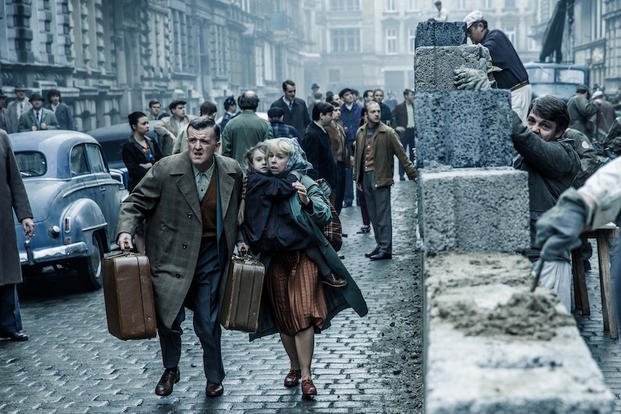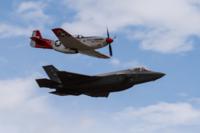Bridge of Spies, the Cold War thriller starring Tom Hanks and directed by Steven Spielberg, is out this week on Blu-ray, DVD and Digital HD. Screenwriter Matt Charman has been nominated for an Oscar for Best Original Screenplay and he talked to Military.com about why he chose to tell the story of attorney James Donovan and why his defense of Soviet spy Rudolf Abel was also a defense of American values.

What inspired you to tell the story of James Donovan?
I got incredibly lucky. I found a footnote in a book. I'm a big fan of this period in history and Robert Dallek wrote an amazing biography of JFK called An Unfinished Life. In the chapter on Cuba, Dallek wrote that JFK wanted to send somebody to negotiate with Castro for the release of the 1500 servicemen that had been caught and captured after the Bay of Pigs fiasco. And he mentioned James Donovan as a New York lawyer who took on the mission.
A footnote of that chapter said that Donovan had first come to prominence for the part he played in the spy swap between Gary Powers and Rudolf Abel. And to be totally honest, the hairs stood up on the back of my neck because I just didn’t have any idea who Donovan was, but it seemed to me that he'd been involved in two incredible moments in history and I just wanted to know more about him.
So I started to research through the New York Times archive and through the Kennedy Presidential Library to find out as much as I could about him. I met his son in New York and his son gave me his blessing to go ahead and tell his father's story. So I pieced it together and was able to go to Los Angeles with a pitch, which was Bridge of Spies, a sort of a 20 minute verbal pitch of the entire movie, all the twists and turns and all of the characters.

How do you think his experiences at the Nuremburg Trials influenced his decision in the Abel case?
What James Donovan experienced in Nuremberg had a massive bearing on his life from that moment on. He was a young man in Nuremberg, he'd been involved actually with the director, John Ford, in cutting together a film that was shown at the trial.
It was a film made by a camera crew who were some of the first people to go into the concentration camps. What they saw was so horrific, what they captured was so horrific, that I think it stayed with James Donovan for the rest of his life. And, indeed, that film has never been shown after the Nuremberg Trial; it's too harrowing.
James Donovan came away from Nuremberg with a sense that justice had been done, but also with a sense of the need for due process, the need for those guys who had done these horrific acts, to face the most thorough possible justice.
Suddenly he finds himself in a position where he is being asked to represent a Russian spy caught operating on US soil. Abel has been here 15 years. He's an enemy of the state. He's all the things that we're told we should fear in the 50's, and, yet, that same voice in his head that wanted Nazi war criminals to have a fair trial makes him want Abel to have a fair trial.
So, absolutely: what happened in Nuremberg, James Donovan carried right through the Abel trial. There's no doubt about it.

Prisoner swaps are in the news here in the USA right now and they're generating a lot of controversy and complaints about appeasement. Did the Abel for Powers and Pryor trade agreement generate a similar level of drama?
Definitely. I mean it was huge. It was huge news after it happened. Obviously, James Donovan needed to operate under a complete veil of secrecy. At the time he had to lie – well, I don’t want to say lie. At the time he had to make up a reason for leaving the country and told his wife and his kids that he was going on a fishing trip. That’s what he told all of his business associates and colleagues at work as well. It had to be kept completely secret. The CIA absolutely stipulated that.
After he returned home, it was huge news and he was on the front page of all of the newspapers. Then Gary Powers finally came back to the US. There were many different Senate hearings and different sort of inquiries into what had gone on and how the plane had been shot down and how he handled himself. It made James Donovan a huge figure.
He had a choice to make at that point and he chose to go back to his life as a lawyer. That’s what made discovering his story so fascinating for me because he was a guy that chose to be a lawyer again, not a celebrity, not someone shouting about his story and the part he played in history, but a lawyer. That’s why I felt the real strong desire to tell his story and to give him his moment.
The point of the whole movie seems to be summed up in Donovan's scene with CIA Agent Hoffman: "But what makes us Americans, just one thing, a rule book. We call it the Constitution and agree to the rules and that’s what makes us Americans." Was that intended as a conscious reminder to viewers as we try to figure out how to interrogate and prosecute a new enemy in the 21 century?
There is no doubt in my mind that even when you're writing a historical film you're influenced by the world around you. You can't help it. I read the newspapers, I watch TV programs and news shows and all the rest of it, and the world you live in informs and permeates the writing you do. Bridge of Spies is as much about the world of the Cold War and of those characters as it is about the world we live in now, the values that we need to hang onto and the ideals that we need to aspire to. And I think that moment in the movie crystallizes it in a really strong way.





